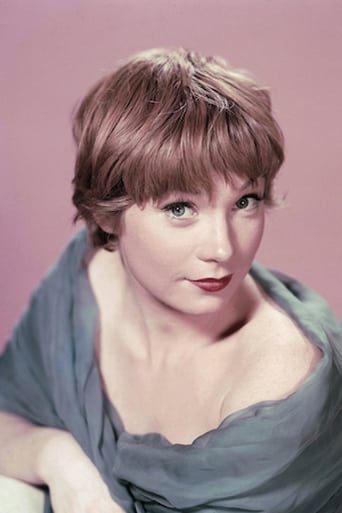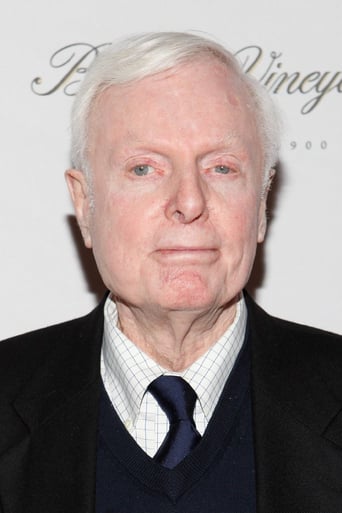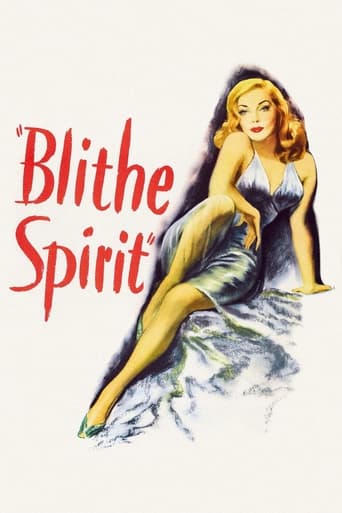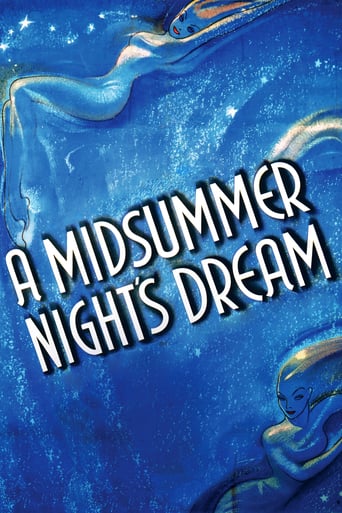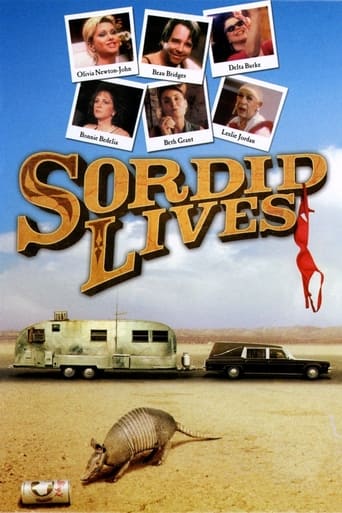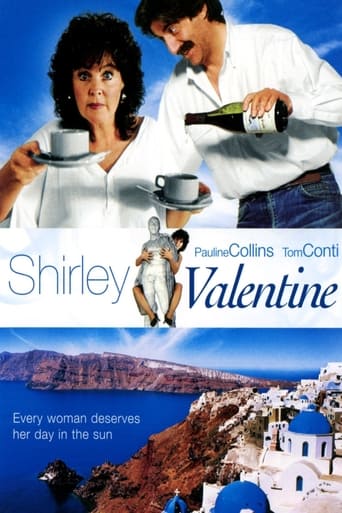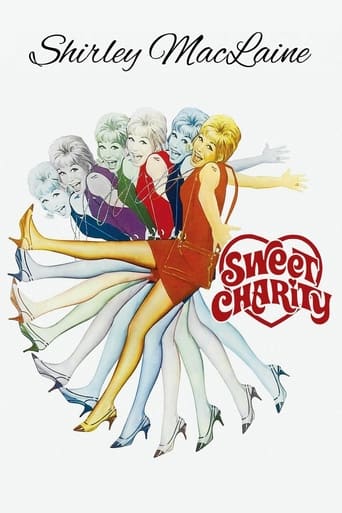
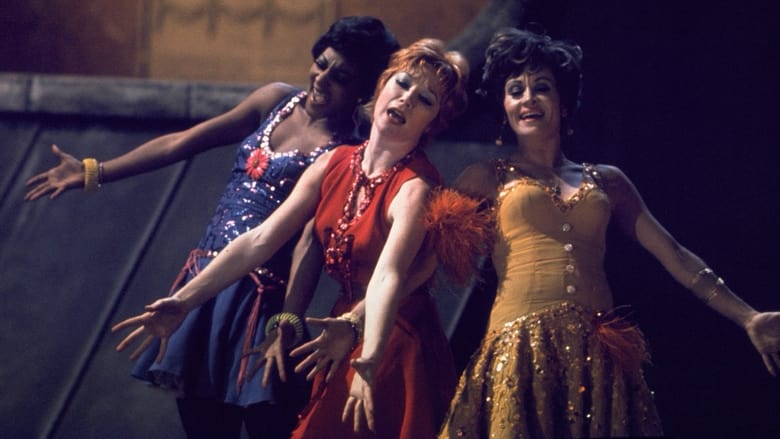
Sweet Charity (1969)
Taxi dancer Charity continues to have faith in the human race despite apparently endless disappointments at its hands, and hope that she will finally meet the nice young man to romance her away from her sleazy life. Maybe, just maybe, handsome Oscar will be the one to do it.
Watch Trailer
Cast
Similar titles


Reviews
Load of rubbish!!
Yo, there's no way for me to review this film without saying, take your *insert ethnicity + "ass" here* to see this film,like now. You have to see it in order to know what you're really messing with.
It is neither dumb nor smart enough to be fun, and spends way too much time with its boring human characters.
This is a gorgeous movie made by a gorgeous spirit.
This film captures poignancies -- the ineffable yearnings of a woman who has been burned in love, the challenges of escaping one's past, the energy and grandeur of New York City, the sadness and waste of conventional thinking.Shirley MacLaine coruscates as a woman with a past. (Is there a female alive who has not experienced Charity's manic elation over a man who is not available?) Also wonderful in their roles are Ricardo Montalban as a suave romantic and John McMartin as the first regular guy Charity ever dates.The song and dance numbers in this film are infectious and mesmerizing. My 12-year-old son started watching out of the corner of his eye, taking breaks from a video game, and got hooked. (Tells you something, doesn't it?) I loved every one of these extravagant interludes, but none could surpass the new-age church scene featuring Sammy Davis Jr. as Big Daddy.Forty years ago as a high-school junior I was part of the chorus in a community production of "Sweet Charity. What a pleasure it was to have the music and lyrics flowing back into my consciousness.This is one exquisite film.CODA: -- "I was going to be an assistant dental technician."-- "That doesn't sound very impressive." -- "It does to a dance-hall hostess!"
Shirley is endearing as the title character, a sweet overly hopeful hard luck dame not overly burdened with brains. Several of the songs-Where Am I Going?, Hey Big Spender, If They Could See Me Now, are excellent but the film is an overblown terribly dated dinosaur. The kind of out of touch production that killed the musical by the end of the sixties. A gargantuan flop upon its initial release costing 20 million and taking in only 8, it's easy to see why peppered throughout as it is with techniques, photos that stop the action dead, freeze frames in numbers, that were outdated even then. There are glimmers of Fosse's genius scattered here and there but he has done better work elsewhere. One of the very rare chances to see Chita Rivera on screen, for that alone it's worth sitting through once but it really a mediocre effort.
I notice that uncredited, but still making a vital contribution to this film was the original Broadway lead Gwen Verdon who assisted her then husband Bob Fosse with the choreography. This has to be one of the truly unselfish acts in a business that's built on ego. Sweet Charity ran 608 performances on Broadway with a flock of Tony Award nominations including Gwen Verdon for the lead of Charity Hope Valentine and two Tony Awards for Bob Fosse for direction and choreography. Fosse came over to Hollywood to repeat his dual roles. But instead of Gwen doing the lead, Shirley MacLaine steps into the part and Gwen assists in the choreography. Quite frankly had she told Universal and her then husband to take their film and follow explicit directions what to do with it, who could have blamed her.Yet there was Gwen Verdon, helping another performer do good in a part she created. Shirley MacLaine did do good in the role and it was a return to MacLaine's own musical roots. Shirley MacLaine has done so many dramatic roles and been Oscar nominated and once a winner for them, people do forget her beginnings were musical. Had she come along ten years earlier she would have been a great musical star. As it is she does have films like Can Can, Artists and Models, and What A Way To Go where we see Shirley singing and dancing. Her first big break was on Broadway replacing Carol Haney in Pajama Game.Charity Hope Valentine, someone who is charging more than 10 Cents a Dance Depression prices in a dance hall keeps having the worst luck in men which is established early on when at the beginning a guy she was just getting interested in threw her off a bridge into Central Park lake and robbed her purse. The latest in a long line of romantic failures. But quite by accident she gets involved with two men, Italian film star Ricardo Montalban and insurance actuary John McMartin who is repeating his role from the original Broadway production.The Cy Coleman-Dorothy Fields score is a bit cut down, but you couldn't do Sweet Charity without Hey Big Spender and If They Could See Me Now. In the latter Shirley's musical talents, singing and dancing, get their full range. It must have been something however to see Gwen Verdon cavorting around the Italian film star's apartment doing that soliloquy of finally hitting the big time and wishing her dance hall girls could see here.As for the dance hall girls, Shirley's peers are led by best friends Chita Rivera and Paula Kelly who along with Shirley do the big production number of Hey Big Spender. Who wouldn't want a little quality time with any one of them.And we get a special treat with Sammy Davis, Jr. doing the Rhythm Of Life church, a satire on those who claim religious tax exempt status for some interesting beliefs. It maybe his best musical moment in film.The ending for a musical is rather unusual, I can't reveal, but nothing similar comes to mind at the moment. Though Shirley MacLaine is great, poor Gwen Verdon died having only had one of her Broadway hits filmed, Damn Yankees.But Gwen was quite the girl helping someone else score a hit with her role.
The strengths of this movie are obvious to anyone who watches it. First are the marvelous song and dance routines that are full of energy and beautifully performed. My only criticism is that a few of them went on a little bit too long which made the movie itself a bit too long - but for the most part they were very entertaining. The movie also featured very strong performances. The primary star, of course, was Shirley MacLaine as the lead character, Charity Hope Valentine a "dance club hostess" (actually, I was not entirely clear if her duties might have included prostitution; it was never explicitly stated, although it was suggested). Good male performances (in lesser roles) were offered by John McMartin as Oscar, who falls madly in love with her but in the end can't marry her, and Ricardo Montalban as Vittorio, an Italian movie star she meets by accident and is smitten with, although there is obviously no future for her in the relationship. In an even lesser, but quite funny, turn was Sammy Davis, Jr. as "Big Daddy" the leader of some sort of hippy-style religious group.The story itself left me with mixed emotions. Adapted from a stageplay, I personally thought it still felt too much like stageplay to me, the medium of the big screen wasn't used well enough. The story began by telling us in an opening caption that Charity is a girl who desperately wants to be loved. It proceeds through some of her adventures as she seeks love. To be honest, it took me a while to get into this, and it wasn't until the appearance of Montalban's Vittorio that I really started to get interested in the story. Once the story grabbed me, though, I found myself rooting for Charity. She was a truly sweet character who deserved love. I had an interesting reaction to her search for love. I'm usually put off by the needlessly romanticized endings Hollywood often offers us in such movies. Here, though, I really wanted that happy ending for Charity, and I felt a little deflated when Oscar dumped her. I got the point of the ending. Finally, Charity found love she learned to love herself; she didn't need a man. The message fit the tenor of the times (1969) in which the movie was made. The woman who once needed a man to feel good about herself finally becomes self-sufficient. Yes I get it. It's a different kind of fairy tale ending, as the closing caption tells us that Charity lived "hopefully ever after" rather than happily ever after. I was still rooting for her and Oscar, though! All things considered, I'd give this a 7/10 for pure entertainment value.
